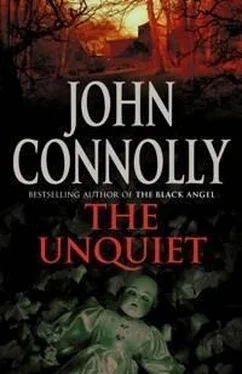I finished my coffee. A wind blew, sending dead leaves scurrying like children fleeing the approach of rain. I knew she hadn’t told me everything, that aspects of what had occurred would remain private, but some of what she had said explained Jerry Legere’s animosity toward his ex-wife, especially if he felt that he was not entirely to blame for what had occurred. There were truth and lies bound up together in what each of them was saying, though, and Rebecca Clay had not been entirely honest with me from the start. I pressed on.
“I mentioned the ‘Project’ that Merrick had spoken about to your ex-husband,” I said. “It looked like he had heard it referred to before.”
“It could have been something private that my father was engaged in-he was always doing research and reading journals, trying to keep up with changes in his profession-but it wouldn’t make sense for Jerry to know anything about it. I mean, they didn’t know each other, and I don’t even remember Jerry coming to check out the security system before my father died. They never met.”
But mention of the Project led me to the final question, and the one that was troubling me the most.
“Jerry told me something else,” I said. “He claimed that you hired a private investigator once before, to look into the your father’s disappearance. Jerry said that the man you hired disappeared in turn. Is that true?”
Rebecca Clay bit some dry skin from her bottom lip.
“You think I lied to you, don’t you?”
“By omission. I’m not blaming you, but I’d like to know why.”
“Elwin Stark suggested that I hire someone. It was about eighteen months after my father had vanished, and the police seemed to have decided that there wasn’t anything more that they could do. I spoke to Elwin because I was worried about Jerry’s lawyer, and I didn’t know what could be done to protect my father’s estate. There was no will, so it was going to be messy anyway, but Elwin said that a first step, if my father didn’t reappear, would be to have him declared legally dead after five years. Elwin’s view was that it would be helpful to hire someone to make further inquiries, as a judge might take that into account when it came to making the declaration. I didn’t have a whole lot of money, though. I was just starting out as a junior Realtor. I guess that determined the kind of person I could afford to hire.”
“Who was he?” I asked.
“His name was Jim Poole. He was just starting out too. He had done some work for a friend of mine-it was my friend April: you met her at the house-who suspected that her husband was cheating on her. It turned out that he wasn’t. He was gambling instead, although I don’t know if that was better or worse for her, but she seemed happy with Jim’s work. So I hired him and asked him to see if he could look into things, even see if he could discover anything new. He spoke to some of the same people that you did, but he didn’t find out anything more than we already knew. Jim might have mentioned something about a project at one point, but I probably didn’t pay a whole lot of attention. My father really did always seem to have some kind of article or essay on the back burner. He was never short of ideas for things to write about and research.
“Then, after a couple of weeks, Jim called to tell me that he was heading out of town for a few days and that he might have some news for me when he got back. Well, I waited for Jim to call again, and he never did. About a week later, the police came to see me. Jim’s girlfriend had reported him missing, and they were talking to his friends and his clients, although he didn’t have very many of either. They found my name among the files in his apartment, but I couldn’t help them. Jim hadn’t told me where he was going. They weren’t happy about that, but what more could I do? Jim’s car was found down in Boston shortly after, parked in one of the long-term lots near Logan. They found some drugs in the car-a bag of coke, I think-enough to suggest that he might have been dealing on the side. I think they figured that he’d gotten into some kind of trouble over the drugs, maybe with a supplier, and that he’d either fled because of it, or been killed. His girlfriend told the police that he wasn’t that kind of guy, and he would have found a way to get in touch with her, even if he was running from something, but he never did.”
“And what do you think?”
She shook her head. “I stopped looking for my father after that,” was all she said. “Is that enough of an answer for you?”
“And you didn’t tell me about Poole because you thought it might dissuade me from helping you?”
“Yes.”
“Was your relationship with Jim Poole purely professional?”
She stood up quickly, almost knocking her cup from the table. It splashed cold coffee between us that dripped through the holes in the table and stained the ground below.
“What kind of question is that? I bet that came from Jerry too, right?”
“It did, but now isn’t the time to get self-righteous.”
“I liked Jim,” she said, as if that answered the question. “He was having problems with his girlfriend. We talked, had a drink together once or twice. Jerry saw us in a bar-he used to call me sometimes when he’d been drinking, asking for another chance-and decided that Jim was getting in the way, but Jim was younger and stronger than him. There was some shouting, and a bottle was broken, but nobody got hurt. I guess Jerry’s still sore about it, even after all this time.”
She straightened the skirt of her business suit. “Look, I’m grateful for what you’ve done, but I can’t let this go on for much longer.” She gestured toward Jackie, as if he symbolized all that was wrong in her life. “I want my daughter back home, and I want Merrick off my back. Now that you know about Jim Poole, I’m not sure that I want you to keep asking questions about my father either. I don’t need to feel guilty about any more people, and every day seems to cost me, like, two days’ pay. I’d appreciate it if we could get this whole thing wrapped up as soon as possible, even if it means going to a judge.”
I told her that I understood, and I’d talk to some people about her options and call her to go through them with her as soon as I could. She headed back to her office to collect her things. I chatted with Jackie Garner and told him about the call from Merrick.
“What happens when our time runs out?” asked Jackie. “We just gonna wait for him to make a move?”
I told him it wouldn’t come to that. I also told him that I didn’t think Rebecca Clay would keep paying for much longer and that I was going to bring in some extra help in the hope of making more progress.
“The kind of help that comes from New York?” asked Jackie.
“Maybe,” I said.
“If the woman ain’t paying you, then how come you want to keep working?”
“Because Merrick isn’t going away, whether he gets what he wants from Rebecca or not. Plus I’m going to shake his tree a whole lot over the next day or two, and he’s not going to like it.”
Jackie looked amused. “Well, you need a hand, you let me know. It’s the boring stuff you have to pay me for. The interesting stuff I do for free.”
Walter was still wet with salt water from his walk with Bob Johnson when I got home, and seemed content to sleep in his basket away from the cold. I had a couple of hours to kill before I was to meet June Fitzpatrick for dinner, so I went onto the Press-Herald ’s Web site and browsed its archive for anything I could find on Daniel Clay’s disappearance. According to the reports, allegations of abuse had been received from a number of children who had been patients of Dr. Clay. At no point was there any implication that he was involved, but questions were clearly being asked about how he could have failed to notice that children whom he was assisting, each of whom had been abused before, were being abused again. Clay had declined to comment, other than to say that he was “very distressed” by the allegations, that he would make a full statement in due course, and that his main priority was assisting the police and social services with their own investigations with a view to finding the culprits. A couple of experts had come, somewhat reluctantly, to Clay’s defense, pointing out that sometimes it could take months or years to get an abuse victim to reveal the depth of what he or she had endured. Even the police were careful not to apportion blame on Clay, but reading between the lines of the story it seemed clear that Clay was taking some of that blame on himself anyway. There was such a scandal brewing that it was hard to see how Clay could have continued to practice, no matter what the outcome of any investigation was. One piece described him variously as “ashen-faced,” “hollow-eyed,” “gaunt,” and “close to tears.” There was a picture of Clay beside the piece, taken outside his house. He looked thin and stooped, like a wounded stork.
Читать дальше












